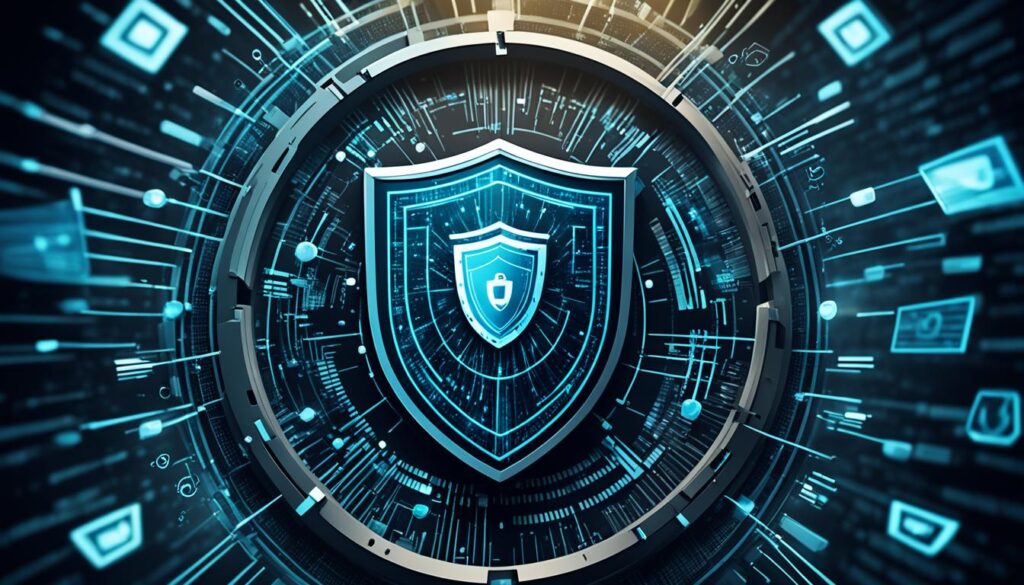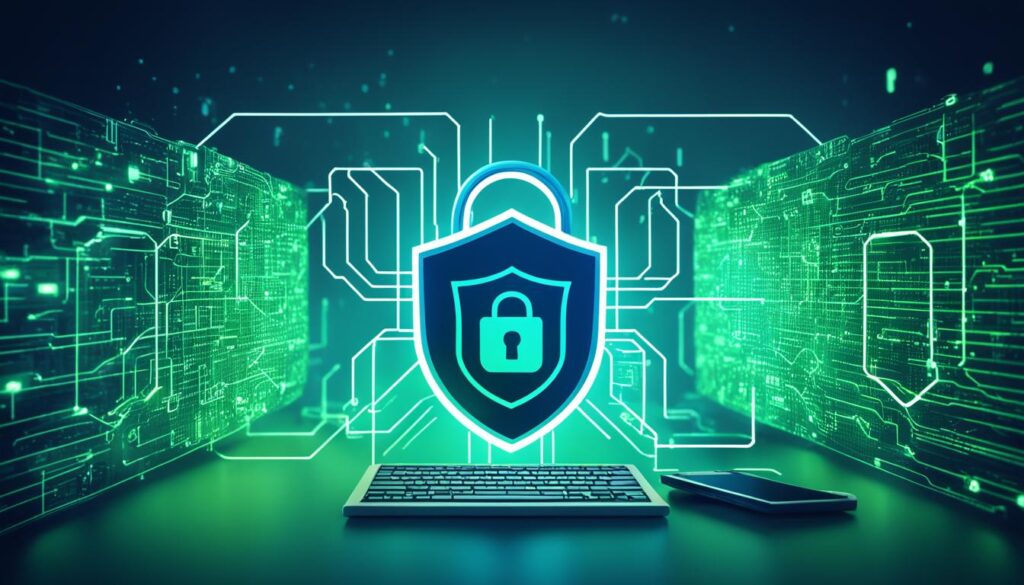In today’s digital age, the importance of cybersecurity cannot be overstated. As businesses increasingly rely on data-driven technologies, safeguarding sensitive information has become crucial. Cybersecurity encompasses various aspects of data protection, including digital security, online security, and internet security. Neglecting cybersecurity measures can lead to severe consequences, such as financial loss and loss of trust from stakeholders.
Data privacy is of utmost significance in the digital realm. It includes safeguarding customer data, such as Personally Identifiable Information (PII), Individual-specific Data (ISD), Delicate Personal Insights (DPI), and Restricted Non-Public Data (RNPD). Organizations must prioritize the protection of their digital infrastructure from potential threats like data breaches, ransomware attacks, and phishing attempts.
Collaboration with vendors and partners digitally introduces additional vulnerabilities, making cybersecurity in the supply chain essential. Regulatory compliance with data protection laws has also become a vital requirement. Businesses must implement comprehensive data privacy frameworks and safeguards, including firewall implementation, encryption techniques, multi-factor authentication, and regular software updates.
In addition to technological measures, employee training programs on cybersecurity best practices are crucial. Empowering workers to protect themselves and the business from cyber attacks is essential in maintaining robust data security.
Key Takeaways:
- Cybersecurity is vital in the digital age to protect sensitive data and maintain trust.
- Data privacy encompasses various categories of customer data, including PII and RNPD.
- Neglecting cybersecurity can result in financial loss and loss of stakeholder trust.
- Compliance with data protection laws and regulations is crucial.
- Implementing comprehensive data privacy frameworks and safeguards is essential.
The Role of Emerging Technologies in Cybersecurity Vulnerabilities
Emerging technologies like artificial intelligence (AI), machine learning (ML), and cloud services have brought many advantages but have also introduced new cybersecurity challenges. The growing dependence on digital systems and interconnected networks, along with the vast volume of data generated, has created a fertile environment for cybercriminals.
Implementing cybersecurity measures promptly is crucial, as any delay can create vulnerabilities that hackers can exploit. New technologies often lack robust security frameworks, making them vulnerable to cyber attacks. The increasing connectivity of devices through the Internet of Things (IoT) and dispersed workforces pose additional security risks.
Organizations need to stay proactive by constantly addressing emerging threats and implementing robust security measures tailored to their specific needs.

Cybersecurity Challenges in the Age of Emerging Technologies:
“The digital transformation has ushered in a new era of cybersecurity challenges. As organizations adopt emerging technologies, they open up new opportunities for cybercriminals to exploit vulnerabilities.” – Cybersecurity Expert
Understanding the implications of these emerging technologies can help organizations enhance their cybersecurity strategy and safeguard their digital systems.
| Cybersecurity Challenges | Description |
|---|---|
| Lack of Security Frameworks | New technologies often lack robust security frameworks, making them susceptible to cyber attacks. |
| Increased Connectivity | The interconnectedness of devices through IoT and dispersed workforces creates additional entry points for cybercriminals. |
| Data Volume and Complexity | The vast volume of data generated by emerging technologies poses challenges in managing and protecting sensitive information. |
| Rapid Technology Advancements | The fast-paced nature of emerging technologies requires organizations to adapt their cybersecurity measures quickly to address new threats. |
Addressing these cybersecurity challenges is vital for organizations to ensure the integrity and security of their digital systems and protect against emerging threats.
The Vital Role of Data Security in the Digital Era
In the digital era, data security is of utmost importance for businesses. With the increasing frequency of data breaches, organizations must understand the potential consequences and take necessary precautions to protect sensitive information.
Data breaches can result in the loss or theft of valuable data, including financial records and intellectual property. This sensitive information can be exploited for malicious purposes, such as identity theft or corporate espionage.
Furthermore, cybersecurity breaches can have significant impacts on business operations. They can lead to downtime, lost productivity, and revenue loss, causing disruptions that can be detrimental to the overall success of the organization.
Additionally, data breaches can have legal and regulatory implications. Organizations may face fines and penalties for failing to adequately protect sensitive information, further emphasizing the importance of data security.
Protecting valuable assets and ensuring data security is crucial for the long-term success and reputation of organizations.

“Data breaches are becoming more common, and organizations need to understand the potential consequences.”
Common Indications for Revisiting Cybersecurity Measures
As cyber threats continue to evolve, organizations must regularly assess the effectiveness of their cybersecurity measures to maintain a strong defense against potential vulnerabilities. Here are some common indications that signal the need to revisit and enhance cybersecurity measures:
- Increased frequency of security incidents: A rise in security incidents, such as data breaches or unauthorized access attempts, can indicate potential weaknesses in the existing cybersecurity infrastructure. Organizations should view these incidents as opportunities to reevaluate their security measures and identify areas for improvement.
- Lack of employee awareness and training: Human error is one of the leading causes of cybersecurity breaches. Insufficient employee awareness of best practices and the potential risks can leave the organization vulnerable. Implementing comprehensive training programs and creating a culture of cybersecurity can greatly reduce the risk of successful attacks.
- Outdated or missing security software: Cybersecurity software plays a crucial role in protecting systems and networks from malicious activities. Outdated or missing security software can leave organizations exposed to new threats or known vulnerabilities. Regularly updating security software and ensuring all necessary tools are in place is essential to maintaining a strong defense.
- Inadequate cybersecurity solution: Organizations must reevaluate their cybersecurity solutions to ensure they provide comprehensive insights into network security, cloud security, and overall environment health. Implementing a robust cybersecurity solution tailored to the organization’s specific needs can significantly enhance overall security measures and threat detection capabilities.
By paying attention to these common indications and taking proactive steps to address any vulnerabilities identified, organizations can strengthen their cybersecurity posture and protect sensitive data from potential breaches.
| Indications for Revisiting Cybersecurity Measures | Actions to Consider |
|---|---|
| Increased frequency of security incidents | Evaluate existing cybersecurity infrastructure, identify weaknesses, and implement necessary improvements. |
| Lack of employee awareness and training | Establish comprehensive training programs to educate employees on cybersecurity best practices and foster a culture of security awareness. |
| Outdated or missing security software | Regularly update security software and ensure all necessary tools are in place to protect against emerging threats. |
| Inadequate cybersecurity solution | Reevaluate and implement a robust cybersecurity solution that provides comprehensive insights into network security, cloud security, and overall environment health. |

The Importance of the Right Cybersecurity Solution
As cyber threats continue to evolve, organizations must prioritize finding the right cybersecurity solution to protect their digital assets. The proliferation of sophisticated attacks and the ever-changing landscape of cybercrime necessitate the use of advanced security tools and technologies.
Implementing a modern cybersecurity solution is essential for fortifying defenses and safeguarding critical systems. Different cybersecurity measures, such as firewalls, antivirus software, encryption, and authentication, work in tandem to create a comprehensive security framework.
One prominent cybersecurity solution that offers comprehensive protection is SolarWinds®. With a wide range of security solutions for infrastructure, networks, systems, applications, and data threats, SolarWinds® helps organizations strengthen their cybersecurity posture.
Automated compliance reporting and quick threat response capabilities provide organizations with real-time insights and enable effective risk mitigation. By leveraging SolarWinds® security solutions, organizations can increase productivity while minimizing security costs and complexity.
Key Features of SolarWinds® Security Solutions
Here are some key features and benefits of SolarWinds® security solutions:
- Comprehensive protection against various cyber threats
- Automated compliance reporting for regulatory requirements
- Quick threat response and mitigation
- Increased productivity with streamlined security processes
- Minimized security costs and complexity
Testimonials
“SolarWinds® security solutions have been a game-changer for our organization. The comprehensive protection and automated compliance reporting have given us peace of mind, knowing that our critical systems are secure.”
– John Smith, IT Director at ABC Company
Investing in the right cybersecurity solution is crucial for organizations seeking to protect against cyber threats effectively. By choosing a trusted provider like SolarWinds®, organizations can mitigate risks, protect their valuable data, and ensure business continuity in the face of growing cybersecurity challenges.

Consequences of a Cybersecurity Breach
A cybersecurity breach can have severe consequences for organizations. The loss or theft of sensitive data can lead to identity theft, corporate espionage, and financial loss. Business disruptions caused by a breach can result in significant downtime, lost productivity, and revenue loss. Legal and regulatory implications, including fines and penalties, can further increase the financial impact. The damage to an organization’s reputation following a breach can lead to a loss of customer trust and potential lawsuits seeking compensation for damages. Implementing robust cybersecurity measures is essential to mitigate these risks and protect the organization.
| Consequences of a Cybersecurity Breach | Description |
|---|---|
| Sensitive Data Loss | The loss or theft of sensitive data, including customer information, financial records, and intellectual property. |
| Business Disruptions | Downtime, lost productivity, and revenue loss as a result of a breach. |
| Legal Implications | Fines, penalties, and legal actions that can significantly impact an organization’s financial standing. |
| Reputation Damage | Loss of customer trust and potential lawsuits seeking compensation for damages, which can tarnish an organization’s reputation. |
Conclusion
In today’s digital age, cybersecurity is crucial for organizations to protect sensitive data, maintain customer trust, and mitigate the severe consequences of cyber threats. By prioritizing data protection and implementing robust cybersecurity measures, businesses can safeguard against cyber attacks and ensure the integrity and availability of critical systems.
Staying proactive and constantly addressing emerging threats is essential. With the right cybersecurity solution and employee awareness, organizations can effectively mitigate risks and protect valuable assets. Investing in comprehensive cybersecurity strategies tailored to their specific needs is vital for long-term success in the digital realm.
Remember, cybersecurity is an ongoing effort. Regular evaluation of cybersecurity measures, prompt response to security incidents, and the use of advanced security tools are crucial in maintaining a secure digital environment. By fostering a culture of cybersecurity, organizations can create a strong defense against cyber threats and establish a reputation for trusted data protection.
FAQ
Why is cybersecurity important in the digital age?
Cybersecurity is crucial in protecting sensitive data, maintaining customer trust, and preventing the severe consequences of a breach. In today’s digital age, where businesses heavily rely on data-driven technologies, ensuring robust data protection measures is essential.
What are the cybersecurity vulnerabilities introduced by emerging technologies?
Emerging technologies like artificial intelligence, machine learning, and cloud services have brought many advantages but have also introduced new cybersecurity challenges. The growing dependence on digital technologies and interconnected networks, along with the vast volume of data generated, has created a fertile environment for cybercriminals.
Why is data security important in the digital era?
Data breaches in the digital era can lead to the loss or theft of sensitive data, which can be used for malicious purposes like identity theft or corporate espionage. Cybersecurity breaches can also disrupt business operations, resulting in downtime, lost productivity, and revenue loss.
What are common indications for revisiting cybersecurity measures?
Increased frequency of security incidents can indicate potential vulnerabilities and the need to strengthen defenses. Lack of employee awareness and training can also contribute to cybersecurity breaches, highlighting the importance of comprehensive training programs. Outdated or missing security software leaves systems vulnerable and requires immediate attention.
Why is the right cybersecurity solution important?
Organizations need the right cybersecurity solution to protect against evolving cyber threats. Various security tools and technologies, such as firewalls, antivirus software, encryption, and authentication, support different types of cybersecurity measures. Implementing modern cybersecurity solutions helps fortify defenses, protect business data, and ensure the integrity and availability of critical systems.
What are the consequences of a cybersecurity breach?
A cybersecurity breach can result in the loss or theft of sensitive data, leading to identity theft, corporate espionage, and financial loss. Business disruptions caused by a breach can result in significant downtime, lost productivity, and revenue loss. Legal and regulatory implications, including fines and penalties, can further increase financial impact. The damage to an organization’s reputation can lead to a loss of customer trust and potential lawsuits seeking compensation for damages.
Why is cybersecurity essential?
Cybersecurity plays a vital role in protecting sensitive data, maintaining customer trust, and preventing the severe consequences of a breach. Organizations must prioritize data security and implement robust cybersecurity measures to mitigate risks and foster a culture of cybersecurity. Investing in comprehensive cybersecurity strategies tailored to the organization’s needs is crucial for long-term success in the digital realm.








